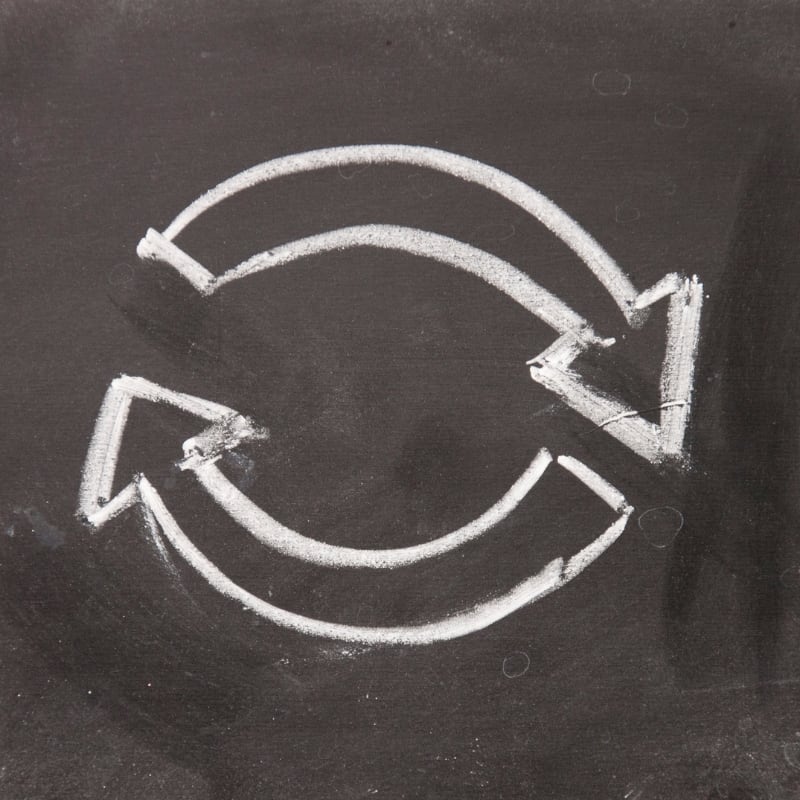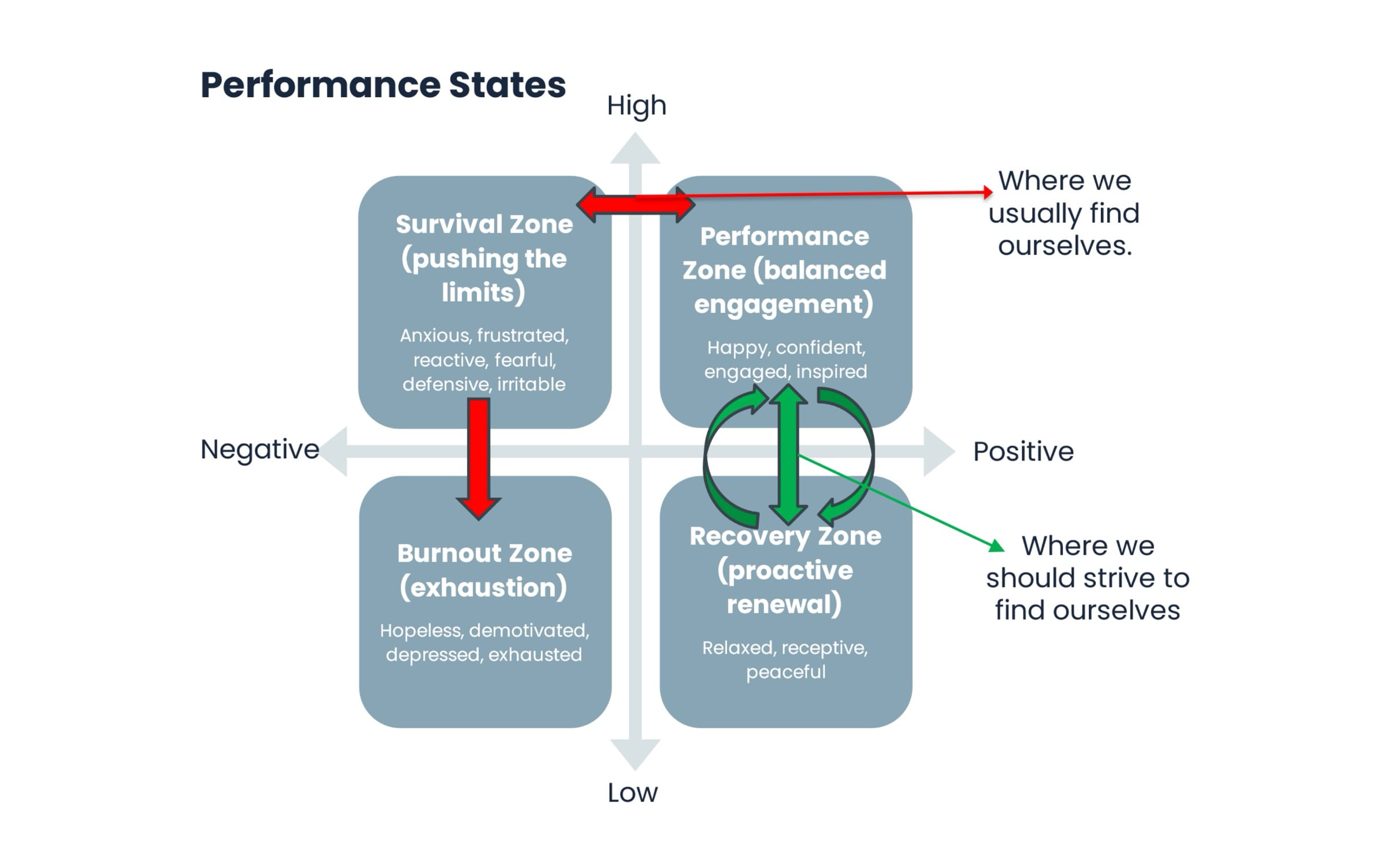Thriving at work: Navigating the sweet spot between performance and recovery

By Antoine Laganiere
During the last few months, I’ve worked with many people on building and maintaining their energetic capacity at work. In thinking about and coaching people through these tough situations, I’m seeing a connection to some of the challenges organizations experience at the generational level. Especially around mindfully weaving in priorities, purpose, and well-being in a transparent and fair way.
The conversation around workplace well-being has shifted in recent years toward using recovery and self-care to sustain high-performance levels. The Energy Project (Jim Loehr and Tony Schwartz), among many other thought leaders, emphasizes the importance of staying in the “performance zone”– where we operate at our best with inspiration and engagement, fueled by regular recovery practices and habits. In fact, the only way to stay at our best is to intentionally oscillate between these two performance states. Otherwise, we inevitably fall into the top portion of the graph, below.
Understanding our ideal performance state
This concept is in part a response to the all-too-common experiences of burnout and survival mode that many professionals, particularly from older generations, have faced throughout their careers. Today, the survival mode can often be mistaken for the performance zone, leaving recovery to happen out of necessity, instead of proactively.

For those who’ve been through the grind of survival mode, the call to action is clear:
We need to intentionally emphasize recovery habits to liberate more energy, be consistently better leaders, foster creativity, and drive inspired performance.
It’s an invitation to rebuild and thrive, both personally and professionally. While this message resonates with people who’ve already experienced some level of burnout, it inadvertently creates a new challenge with younger professionals.
For younger generations, the messaging around the importance of recovery can be paradoxically misleading. On one hand, it’s essential for younger professionals not to fall into the same traps of overwork and exhaustion that plagued earlier generations. On the other hand, there’s a risk of creating a culture of fear, where the possibility of burnout looms so large that it leads to an overcorrection and lack of perspective.
This overcorrection can manifest as an emphasized focus on recovery and self-care, to the point where younger professionals might spend too much time in the renewal zone, avoiding the very challenges necessary for personal growth and fulfillment. In a way, we’re making self-care and recovery an end in itself. We might struggle to understand the delicate balance between pushing ourselves to achieve, and knowing when or how to engage in recovery.
Overcoming generational tensions and missed opportunities
This overcorrection creates two significant challenges:
- It breeds frustration and resentment among older generations. Those who’ve spent years, if not decades, navigating the highs and lows of a demanding career may see the younger generation’s focus on recovery as laziness or lack of accountability towards the organization or team. This generational tension can lead to misunderstandings and a divide in the workplace, where the older generation feels the younger one is entitled or not pulling its weight, especially when they want the same professional outcomes. It also might cause a reversion to an emphasized survival zone culture, which we don’t want either.
- Younger generations may miss out on the inherent joys and deep fulfillment that come from embracing challenges and overcoming obstacles. The performance zone isn’t just about maintaining a steady state of productivity; it’s also about experiencing the satisfaction that comes from pushing boundaries, solving complex problems, and growing through adversity – in a balanced way. If the fear of burnout and subsequent emphasis on self-care leads to avoiding these challenges, younger professionals may never fully tap into their potential or experience the true rewards of hard work and perseverance.
Experimenting with our limits builds resilience, confidence, and capability
We need to continue recalibrating the way we talk about performance and recovery.
Instead of emphasizing recovery as a preventative measure against burnout, we should frame it as a way to achieve sustained growth and fulfillment.
Rather than an escape from work, we should see regular and deliberate recovery as something that helps us to take on greater challenges, something that integrally contributes to each of our unique expressions of our purpose.
As younger professionals, we also need to experiment with our limits, understand that it’s okay to push into the performance zone and occasionally flirt with the edges of survival mode, as long as it’s done mindfully. This is crucial for developing resilience, building confidence, and discovering the true extent of our capabilities. In being aware of our assumptions around this topic, leaders can better help their people navigate this challenge. First, we need to make it clear we’re not expecting people to operate in the survival mode as a norm. Second we need to check in with our people and ask how they’re doing – and if they’re in survival mode, we need to ask why and help them through it.
While the focus on recovery and well-being is important, we can’t swing the pendulum too far in the opposite direction. For all generations, the challenge is finding the right balance and the younger ones have a great opportunity to do so in a conscious way. Although this is hard work, there are ways to go about this journey, as an individual, a team and an organization. Let’s not get lost in black and white, us-vs-them thinking, and work together to create a progressive and practical outcome for all.
Coaching can help
At Impact, our Individual and Team coaching programs help you and your people optimize performance and recovery – so everyone can contribute their very best to help drive your organization forward. Contact us to learn more.




